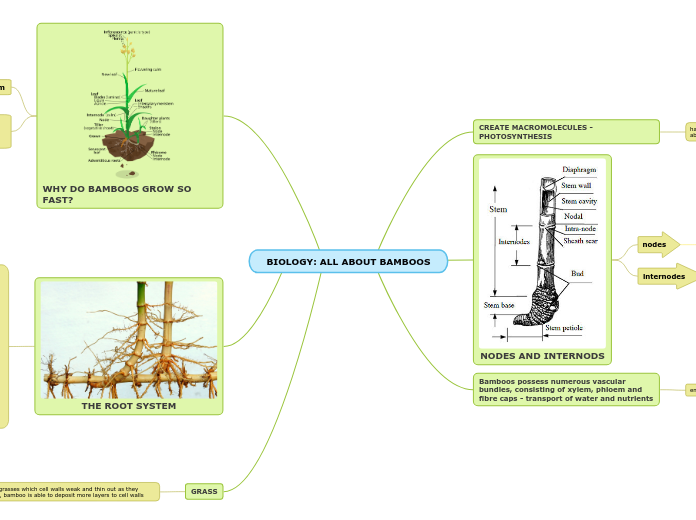BIOLOGY: ALL ABOUT BAMBOOS
CREATE MACROMOLECULES - PHOTOSYNTHESIS
has green pigment aka chlorophyll which helps in the absorption of the sunlight
alonside using carbon dioxide and water, glucose is formed -macro molecule used to derive energy for the various processes of the body of the bamboo
NODES AND INTERNODS
nodes
grows new shoots and roots
internodes
completely hollow
Bamboos possess numerous vascular bundles, consisting of xylem, phloem and fibre caps - transport of water and nutrients
embedded in parenchymatous tissues.
WHY DO BAMBOOS GROW SO FAST?
extensive root system
multiple sections or nodes waiting to elongate; cells for this event are already in position for this explosive growth.
when bamboo plants are still small buds, they produce all of the cells they require to grow.
unlike mitosis and those in animals, do not need to split apart as they expand; they stretch out.
Water fills the cells, causing them to expand rapidly
THE ROOT SYSTEM
underground system of a bamboo stem/culm is known a rhizome; not roots - grow horizontally inside the soil and give rise to roots that are not too long
clumping bamboo
rhizomes that grow upwards developing into a new culm. New rhizomes emerge from buds on an existing rhizome and so forth. This accumulative effect causes the grove to expand slowly around the perimeter.
running bamboo
rhizomes that run horizontally under the ground. New buds and roots emerge from the nodes of the rhizomes. Most buds remain dormant but may develop into a new culm or it may develop into another new rhizome. Any new rhizomes will also run horizontally underground and produce more news culms and rhizomes. This growth behavior gives the bamboo a 'running' habit.
roots grow under the rhizomes
axillary buds on the rhizome can produce new rhizomes, or bamboo shoots which grow into culms
GRASS
unlike grasses which cell walls weak and thin out as they stretch, bamboo is able to deposit more layers to cell walls
plant adaption:
